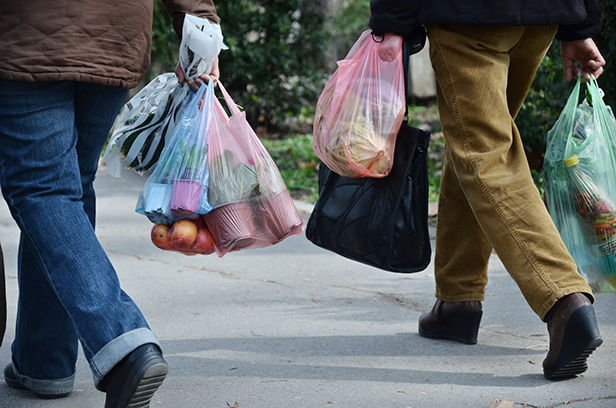Product Hub March 05, 2021
Philly, Suburbs Sue PA Over Plastic Ban Moratorium
Prohibitions on single-use plastic products like bags and straws could help promo distributors sell alternatives like totes and reusable straws.
Philadelphia, along with the nearby suburban towns of West Chester, Narberth and Lower Merion, have sued Pennsylvania over a law that prevents them from enacting or enforcing bans on single-use plastics, such as bags or straws.
Where bans on single-use plastic products go into effect, they can potentially create opportunities to sell more branded reusable alternatives like tote bags and stainless-steel straws. That could be a boon to promotional products distributors struggling during the pandemic. Depending on the exact nature of the bans, however, costs may go up for retailers, which could result in them having less money for marketing purposes.

Last May, state lawmakers enacted rules that prohibit municipalities in the Keystone State from enacting bans on single-use plastic products. They did so by attaching the measure to an unrelated budget bill on the day it was approved, the municipalities said, violating a law that requires legislation to only cover a single subject. The petition from Philadelphia and nearby towns, filed on Wednesday, March 3, also said the law violates the environmental rights amendment to the state constitution, which prevents the state from acting against “protected environmental interests.”
Currently, the state prohibits laws regulating single-use plastic until July or six months after Pennsylvania Governor Tom Wolf lifts his COVID-19 state of emergency order, whenever that may be. However, Philadelphia officials are planning to implement the ban anyway, The Philadelphia Inquirer reported. The city will have a grace period for businesses before beginning enforcement in October, according to Philadelphia’s Deputy Commerce Director Karen Lockhart Fegely.
Enacted in 2019, Philadelphia’s bag ban was set to begin the first of this year, but Mayor Jim Kenney announced it would be delayed for the second time due to the pandemic’s impact on local businesses. Philadelphians use an estimated 1 billion plastic bags a year, according to Clean Air Council attorney Logan Welde. Many of them end up as litter on city streets and in trees and waterways. It can cost millions of dollars each year to clean up, WHYY reported.
"We are finding local solutions to local problems..." Philadelphia, suburban towns sue state over moratorium on plastic bag bans https://t.co/f34TpgqxW3 @WHYYNews
— Joanne McLaughlin (@joannemclaugh) March 3, 2021
Since 2016, eight states – California, Connecticut, Delaware, Hawaii, Maine, New York, Oregon and Vermont – have banned single-use plastic bags. Major cities with such bans include Boston, Chicago and Seattle. In 2019, state lawmakers introduced at least 95 bills related to plastic bags, either outright banning them or placing a fee on them. Ban proponents say the pollution spoils natural habitat and poses a danger to wildlife, which can choke on or become caught in the disposables.
Several plastic bag bans, including trendsetter California’s, were temporarily lifted at the beginning of the COVID-19 pandemic, as certain studies suggested that reusable bags, when not cleaned properly, can become “petri dishes” for bacteria and the like. That led retail, grocery and plastic industry advocates to call on legislators to suspend single-use plastic bans to better protect retail/grocery workers. Last summer, most bans were reinstated.
Now, the “green wave” has risen again in 2021, as Colorado and Rhode Island have considered anti-plastic legislation. In February, George Washington University announced that it will be eliminating single-use plastics from campus. Other schools such as Georgetown University and the University of Montana are also pushing for a similar ban on single-use plastics.
In 1950, the world’s population of 2.5 billion produced 1.5 million tons of plastic, according to Surfers Against Sewage, a marine conservation charity based in the United Kingdom. In 2016, a global population of more than 7 billion people produced more than 320 million tons of plastic. The 2016 tally is set to double by 2034. Every day, approximately 8 million pieces of plastic pollution find their way into oceans, according to Surfers Against Sewage.

Product Hub
Find the latest in quality products, must-know trends and fresh ideas for upcoming end-buyer campaigns.
